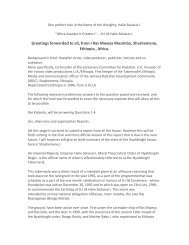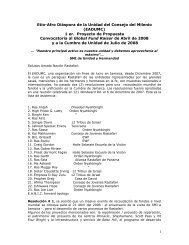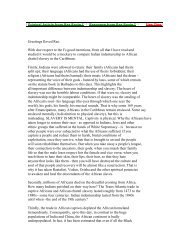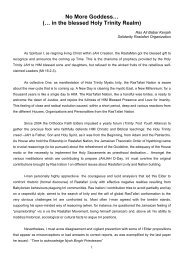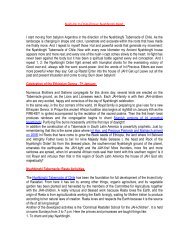DRAFT Universal Hair Exemption Letter TO: United ... - RasTa Ites
DRAFT Universal Hair Exemption Letter TO: United ... - RasTa Ites
DRAFT Universal Hair Exemption Letter TO: United ... - RasTa Ites
You also want an ePaper? Increase the reach of your titles
YUMPU automatically turns print PDFs into web optimized ePapers that Google loves.
The people to which we refer with the phrase "Native Americans" comprise, in fact,<br />
many different tribes each of which has its own, individual mores, social characteristics<br />
and spiritual beliefs. Only superficially can we lump them together for discussion of their<br />
spiritual practices. That having been admitted, I will, nevertheless, submit that many<br />
Native Americans believe that a man's vitality and strength reside in his hair<br />
(Kentshmith, 1973 at pg. 576) and that his hair is a gift from the Creator, to be cut only<br />
when someone close to them dies. (Hamilton, 1996)<br />
Sikhism is a religion that, worldwide, is practiced by approximately as many people as is<br />
Judaism. The last in its succession of ten Gurus, Gobind Singh, directed that male<br />
practitioners were to refrain from any form of hair cutting. (Cole & Sambhi, 1978 at pg.<br />
36) The Guru's rationale is believed to have been that haircutting was unnatural and,<br />
hence, unGodly. (Cole & Sambhi, 1978 at pg. 111) Additionally, it's believed that he<br />
intended for the appearance generated by the ongoing practice of abstention from<br />
haircutting to enhance solidarity and religious loyalty among Sikhs. (Cole & Sambhi,<br />
1978) Though the Sikh who cuts his hair is never an outcast, he is clearly differentiated<br />
from those who "keep the five Ks", one of which relates to uncut cranial and facial hair.<br />
Male <strong>Hair</strong> Denigration<br />
Military regimes across time and cultures have been well known to require the removal of<br />
cranio/facial hair for initiates. For example, new members of the French Foreign Legion<br />
had their hair cut down to half a millimeter; allegedly to keep them free from lice - in<br />
reality to bestow on them a feeling of nothingness. (Rom, 1973 at pg. 22) When after<br />
their basic military training they felt integrated into this establishment, they were allowed<br />
to grow their hair again. (Rom, 1973 at pg. 22) Upon subduing the Gauls, who esteemed<br />
long hair as a distinct honor, Julius Caesar required them to cut their hair as a token of<br />
submission. (Kentsmith, 1973 at pg. 573) For the same purpose, the Chinese Manchus<br />
imposed the partly shaven head and pigtail upon the Haun men when their dynasty was<br />
conquered. (Kentsmith, 1973 at pg. 573) Forced hair removal was effected against<br />
collaborators during the German occupation of France. (Synnott, 1987 at pg. 402)<br />
<strong>Hair</strong>cutting was a punishment for adultery in India and among the ancient Teutons, and<br />
for other crimes in Assyro-Babylon. (Rabinowitz, 1984 at pg. 271)<br />
Why do those in authority want men to shave their faces and cut their cranial hair short?<br />
It has been posited that the hair of prison inmates and soldiers is kept cut as a reminder<br />
that "you are not a free person and cannot do as you please with your own body."<br />
(Rabinowitz, 1984) Shaving produces effects like other means of fostering a youthful<br />
appearance because a "clean-shaven" face mimics the surface quality of the pre-pubertal<br />
face. (Guthrie, 1976 at pg. 30) Therefore, requiring a man to shave can have the effect of<br />
reducing his status, and his self-perception, toward that of a child. Moreover, we live in a<br />
world that has, cross-culturally and over time, viewed men collectively as being cold,<br />
aggressive, strong willed, and dangerous. (Martin, 1987; Rosenkrantz et al, 1968;<br />
Broverman et al, 1972) Women as a class, on the other hand, have been generally<br />
presumed to be warm, submissive, obedient and nurturing. (Martin, 1987; Rosenkrantz et<br />
al, 1968; Broverman et al, 1972; Sapadin, 1988) Forcing or coercing a man into daily<br />
shaving can be seen as assigning to him the less threatening, feminine role. Most to the




